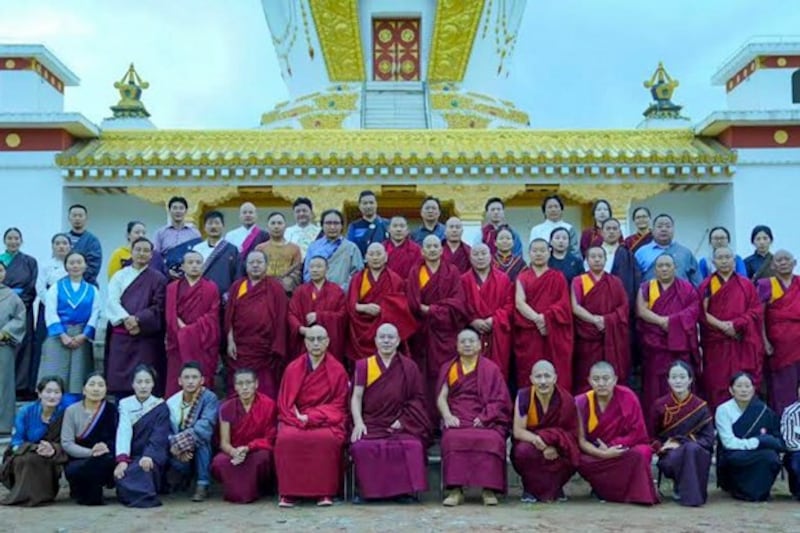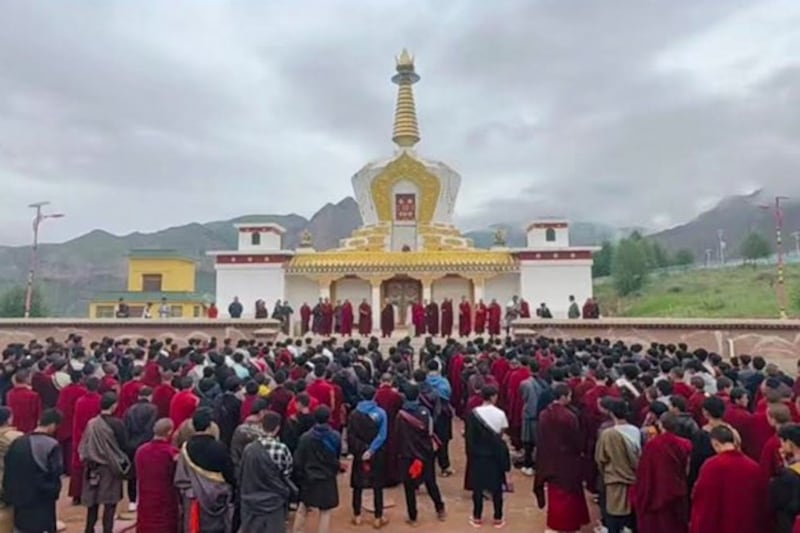UPDATED at 12:42 P.M. ET on 07-17-2024
The Chinese government has shut down a prominent vocational high school in a Tibetan area of Qinghai province, making it the latest in a slew of Tibetan private schools that have been forcibly closed in recent years.
The Gangjong Sherig Norling school in Golog county, or Guoluo in Chinese, is in the historical Amdo region of Tibet. It was founded in 1994 by Ragya Jigme Gyaltsen, the principal, and is renowned for its modern and traditional education on Tibetan culture, philosophy and religion.
In an announcement in both Tibetan and Mandarin dated July 14, Gyaltsen said the school was closing because it was not in compliance with standards set by the Qinghai Provincial Party Committee for vocational schools. However, no specifics were provided.
The 30-year-old school is the latest in a series of private schools forcibly closed in recent years, sparking concern among Tibetans over efforts by Chinese authorities to eradicate Tibetan language and culture.
Tenzin Lekshey, spokesperson for the Central Tibetan Administration — the Tibetan government-in-exile — expressed disappointment over the school’s closure and condemned the Chinese government’s actions, stating that the move highlights Beijing’s disregard for the wishes of the Tibetan people.
“The forced closure of Tibetan schools underscores the Chinese government's escalating policy to eradicate and undermine Tibetan language and culture,” he said.
Gyaltsen also announced the closure of the school last week at a graduation ceremony for 110 students.
In tears
Videos of the graduation showed students in tears upon hearing news of the closure. The students, dressed in traditional Tibetan attire, were seen carrying the traditional Tibetan white ceremonial scarves as a mark of respect and gratitude for the school.
During the past three decades, the school has served as a vital hub of learning for Tibetan cultural and linguistic studies, drawing youth from across Tibet, Mongolia and Inner Mongolia.
The school’s rigorous curriculum also includes English, computer science, engineering, medicine, filmmaking and physical education.
RELATED STORIES
[ China closes 2 Tibetan monastery schools, sends novices to state boarding schoolsOpens in new window ]
[ New school for overseas Tibetan kids aims to preserve languageOpens in new window ]
[ Students banned from speaking Tibetan in Sichuan schoolsOpens in new window ]
In all, nearly 2,300 students have graduated from the institution where distinguished Tibetan scholars such as Berza Tsultrim, Dong Younten Gyatso and Mangri Gyadol have served as professors.
Graduates have gone on to become researchers, doctors, civil servants, teachers, monastery leaders and administrators.
At the time of its closure, the school is reported to have had 1,400 students and 58 faculty and staff.
Hub for Tibetan studies
The school’s closure has sparked concern and consternation both inside and outside Tibet, with many former students and Tibetan language activists expressing disappointment and outrage.
About 1,000 Tibetans participated in a candlelight vigil on Wednesday in Dharamsala, India, condemning the decision to shutter the school and expressing solidarity with Tibetans inside Tibet.
The protest, marking International Justice Day on July 17, was organized by a coalition of eight NGOs, including the Tibetan Youth Congress, Tibetan Women's Association and Students for a Free Tibet, which blasted China's human rights violations in Tibet and demanded the restoration of the rights of Tibetan children to be educated in their own language and culture.
A former student of the school posted a short video on social media in which he said the shutdown of a “homeland school fully engaged in preserving the language and culture of the Tibetan race makes me feel very sad.”
“Today, a black snowfall has fallen on Tibet and the light of Tibet has gone out,” wrote one Tibetan netizen on Chinese social media.

Another wrote: “The school is regarded as the pride and shining beacon of the Tibetan people, a great star in our society. Without it, we would not be aware of the state of our language. In a way, our people are truly unfortunate.”
However, a former school employee now living in the United States said she wasn’t surprised about the school’s closure because rumors about it had circulated for some time.
“The local government has been trying to shut down schools that are not under their control, especially independent Tibetan language private schools,” said the woman who requested anonymity for fear of backlash.
“Many students and teachers I know are heartbroken and in despair,” she added.
Restrictions
Penpa Tsering, the Sikyong, or political leader of the Central Tibetan Administration, told RFA that the Kashag, or Cabinet of the government-in-exile, is concerned about the school’s closure, which has helped Tibetans preserve their identity.
“It is clear that the Chinese government instead of improving the conditions in Tibet, rather they are worsening the situation day by day,” he said, adding that the Kashag fears Beijing will take similar action in other parts of Tibet.
According to the Central Tibetan Administration, repeated attempts had been made in the past by Chinese authorities to shut down the school, including levying lawsuits against Gyaltsen by falsely accusing him of accepting bribes while serving as chairman of the Snow Land Pastoral Association and the Qinghai-Tibet Trade Association.

After a trial, the charges against the school were dismissed, and Gyaltsen was acquitted of any wrongdoing. However, he was temporarily suspended from his role as a member of the Tibetan Nationalities Council.
Since 2020, the Chinese government has imposed stricter restrictions on language rights in Tibet, resulting in the closure of private Tibetan schools and a heightened emphasis on Chinese-language education in the name of standardizing textbooks and instructional materials.
In 2021, authorities also began banning Tibetan children from attending informal language classes or workshops during winter breaks.
Activists warn that these measures could threaten the survival of the Tibetan language in the region and undermine its viability nationwide.
Nyima Woser, a researcher at the India-based Tibetan Centre for Human Rights and Democracy, told RFA that the forceful closure of the school violates China’s own constitution, autonomous regulations and international laws.
The school's shutdown coincided with the signing into law U.S. legislation on Tibet that urges the Chinese government to address the aspirations of the Tibetan people concerning their unique historical, cultural, religious and linguistic identity.
Additional reporting by Tashi Wangchuk, Lhuboom, Sonam Lhamo, Rigdhen Dolma and Lobsang Gelek for RFA Tibetan. Translated by Dawa Dolma and edited by Tenzin Pema for RFA Tibetan. Edited by Roseanne Gerin and Malcolm Foster.
The story was updated to add information about the protest in Dharamsala, India.

